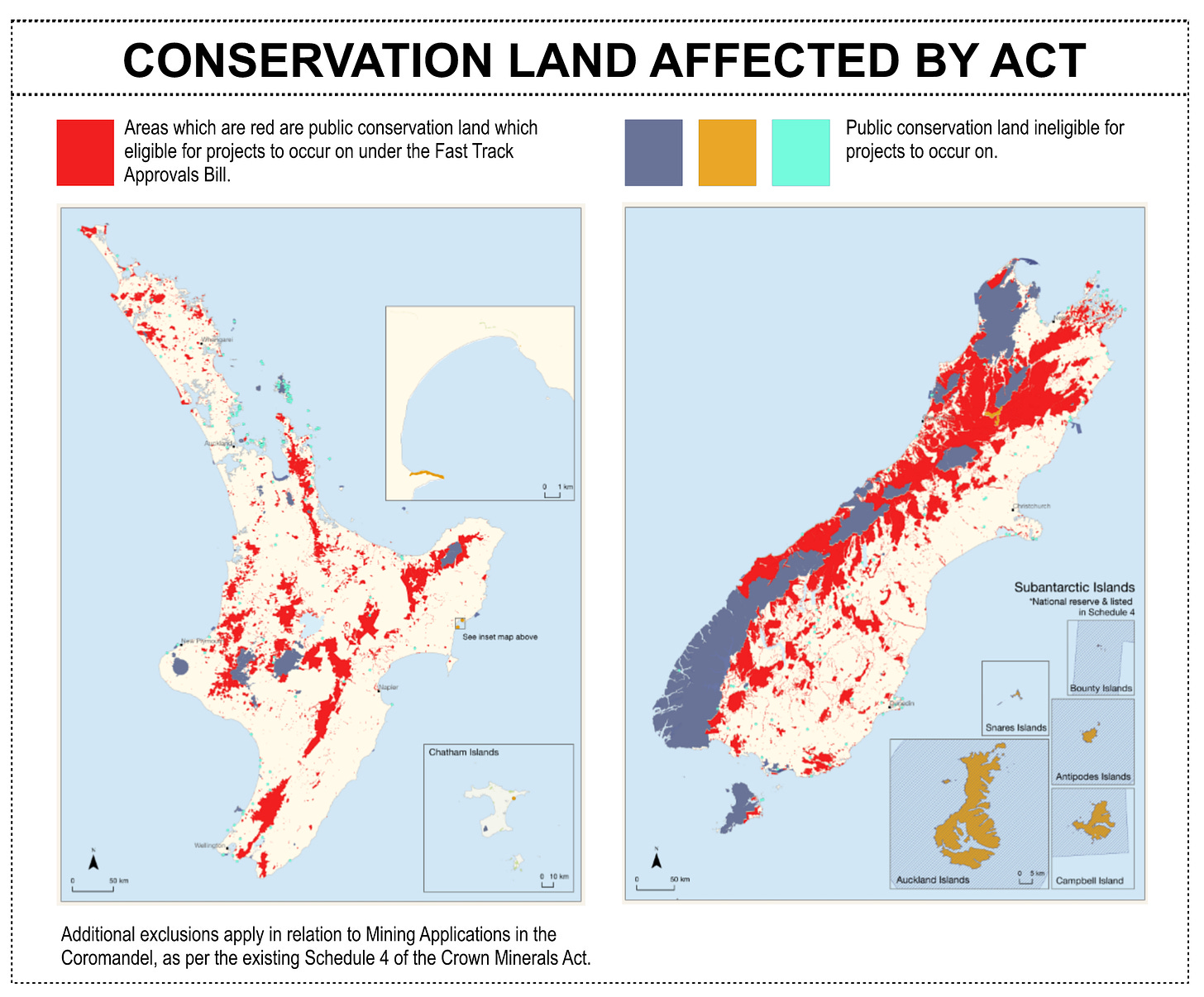New Zealand deserves better than marketing
A name change & "switch and bait" could still expose Aotearoa NZ to more risks and higher costs under the Government's Fast-Track consent bill.
THE GOVERNMENT DROPS THE TITLE “FAST-TRACK” FROM FAST-TRACK BILL
Today the Coalition Govt said they were doing away with the name “fast-track.” This is a Govt of professional lobbyists so I am not surprised by their attunement to marketing.
“Fast-track” became bad for business. Many people have an inkling it has an adverse relationship to the environment and democracy. Kiwis were starting to clue on.
The name had to go.
Make no mistake - the Govt has softened its stance of late regarding fast-track.
27,000 public submissions and a “March for Nature” protest (video above) made it clear that the public is paying attention.
From my observations, I’ve found it’s the only time this Govt. is responsive to evidence or large scale concern - sufficient numbers and negative publicity. Once they can no longer control the narrative, they inevitably fold.
Think of the other examples - the cancer drug u-turn and the Prime Minister’s Premier House allowance.
It’s likely that NACT1 may remove the unilateral, authoritarion powers of the 3 Minsters originally proposed in the Bill.
And it’s a start but nothing close to satisfactory if we care about positive outcomes.
As Forest and Bird’s CEO Toki warned,
“Removal of ministerial override is meaningless unless environmental protections and public participation in existing legislation is retained.”“We want to avoid a bit of a bait-and-switch here,” she added. “I want to make that really clear: that can’t be the only thing.”She’s accurate, and astute. And yes, she used the word “meaningless.”
What is at stake? Here’s one example.
Australia’s TTR wants to suck up 50 million tonnes of our seabed each year for 35 years in shallow water off Pātea to extract iron, titanium, and vanadium. After extraction, the mining ship would then discharge 45 million tonnes of sediment back into our waters.
TTR has lost that battle to do so for over a decade. Yet, TTR was personally invited by Chris Bishop to apply under NACT1’s Fast-Track consent process and withdrew from the existing consent process. And therein selected Govt appointees can and will over-ride our Courts unilaterally.
Watch Minister Chris Bishop describe it for himself here:
To be clear, the concerns on Fast-Track are manifold:
A severe lack of transparency and clarity
Key impacted stakeholders should have an opportunity to understand the implications of proposals, and have their voices heard.
The media should have an opportunity to report on clear facts.
Access should not be confined to corporate lobbyists and industry group representatives.
Democratic processes should not be subverted intentionally as we saw with Chris Bishop’s handling of fast-track information.
The cost-benefit of the fast-track decisions must be completed and fully on the record before a decision is made.
Yet, if the fast-track bill passes, the public will be unable to submit on individual projects. Transparency will be limited. And, if the Govt’s track record so far is anything to go by, intentional subversion and concealing of information, could become the norm.
Think of the Govt’s judgement on unilaterial decisions so far: e.g. allowing our waterways to be polluted, bringing back live animal exports, spending $70bn on roads and increasing taxes and imposing tolls to pay for it, while refusing to fund road safety measures or cycling paths, and cancelling Kiwirail’s cost effective North-South rail and ferry link, the Interislander.
Finally, decades of judicial decisions should not be overriden by a govt that has made it clear NZ is now about profit above all.
Medium to long term costs
The NACT1 Govt has stated it intends to speedrun fast-track approvals. Due diligence is minimized. “Industry” feedback will be overweighted, as with the smoke free repeal where the Govt was basically parroting tobacco industry lobbyists and intentionally left out $46bn worth of benefits from Cabinet papers. Wild.
So at what cost to New Zealand, our communities, and our future?
If the Govt’s pattern of behaviour continues as it has, we may not even truly understand the implications of decisions until it is too late.
For example, for Kiwirail’s Interislander, Nicola Willis concealed significant details when she accused Kiwirail of a “blowout.” In fact, we had fixed price ferries at 40% less cost than market and that would future proof our North-South link. Seismic upgrades drove costs up by double since 2021.
The engines were built and tested on rail enabled ferries when Willis ordered it cancelled. As a result of we have lost ~$500mn plus a reputed $300mn in penalties - with nothing to show for it. That’s almost a billion dollars.
How many doctors, teachers, police, nurses, hospital builds, schools without asbestos would that have bought us?
Do we trust that this Govt is making sensible, cost-effective decisions for New Zealand?
Environmental impact
On environment, the message is clear.
Killing our wildlife and destroying nature for “economic benefit” is not only on the cards, it’s recommended.
And for what - 2% of mining profits.
Here’s a short clip of Luxon, Bishop and Brown laughing supportively to Shane Jones’s comments regarding fast-track’s impact on the environment. Enough said.
Potential for corruption
There’s not enough space to cover this topic on the internet. Suffice to say - the Auditor General of NZ has said the bill poses signifiant risks to conflicts of interest. Dame Ann Salmond wrote, “Rather than being scrupulously avoided, conflicts of interest lie at the heart of the govt’s proposed fast-track process.”
Senior ministers have been wined and dined by potential applicants, industry links have been omitted, personal invitations were sent to seabed mining companies like TTR, and secretive money links to fossil fuel / mining companies are in play. It truly is a “lolly scramble.”
Yes, the conflict of interest situation is bleak.
The independence of “advice” related to fast-track decisions
The NACT1 Govt’s “independent” experts so far this term include:
Former National party MP Bill English and co. who were paid $500,000 from emergency housing in a report rife with omissions and hearsay to …. (drum roll, please) echo the Govt’s exact position on Kainga Ora.
Kiwirail’s “independent” panel of experts who were hand appointed selectees earning thousands of dollars a day - all with minimal relevant expertise.
A former Fonterra Board Director has been appointed to “independently” review methane targets for the agriculture industry and roll back our climate change commitments
This Coalition Govt has a consistent track record of using the “independent expert panel” as a shield to pave their narratives and present an air of objectivity - all with appointees who are hand selected and paid for by the same Govt.
And almost magically, always echo its intentions.
Do we expect the fast-track advisory panel to be any different?
In summary, if the bill changes, we can celebrate that public attention has helped to remove the obvious authoritarian power component, but recognise there are very serious issues remaining.
Legal experts such as Colin Keating have offered alternative ways to address the govt's desires.
The Government should listen.
Forest and Bird were right.
If the Coaliton govt. don’t make substantive changes - even notwithstanding the Ministerial powers - that act alone, and any marketing gimmicks will be “meaningless.”
Stay tuned. Don’t be fooled yet. And stay active.
TLDR: Even if the Government removes the unilateral and authoritarian decision making powers from the 3 Ministers, the bill in its current form remains problematic, and open to corruption and poor outcomes for New Zealand.
Stay tuned on developments on the new “don’t call me fast-track” fast-track bill.
EXTRA -
BACKGROUND TO FAST-TRACK - A primer for those who aren’t familiar with its evolution
The Fast-Track Bill was one of 14 pieces of legislation passed under urgency in the conservative government’s first seven weeks in power.
None of those 14 bills went to a select committee in an extraordinary sign of what was to come under this Coalition Government - an authoritarian bent, going to great lengths to create pre-conceived narratives, and “unlawful and unreasonable” attempts to subvert the democratic process.
Still, the fast-track bill stood apart in its creation of an entire framework for authoritarian powers, abuse of power, environmental degradation, and negligence of care.
It effectively represents the corporatisation of New Zealand and the superiority of companies over the common person.
At the time, the New Zealand Law Society issued a stark warning about using urgency for a change this significant.
New Zealand legal experts said the bill would open the country up to “abuse, or authoritarian excess.”
Our own Government Ministry of Environment found “every major aspect of the Bill flawed.” And that it may end up slower and more expensive than alternatives.
Last but not least, the capacity for corruption in the lolly scramble is un-muted.
And for those who need a reminder, here is Mr Shane Jones in Parliament House last year, explaining the Govt’s vision for Fast-Track.
Psst…..Native frogs are actually deaf, not blind, Mr Jones
Another fun fact: NZ already had a fast-track bill from the last Government.
The elements of transparency, democracy and balancing the economy with community, due diligence and environment all changed with NACT1’s repeal under urgency in December 2023.
The Planning Institute of NZ submitted that NACT’s fast track could detrimentally impact NZ - especially if fast track is used to develop over flood impacted lands etc. which will cost us more in the long run. It expressed concerns that it could be used to prioritise short term economic gains over our country’s long term well-being and the. environment.
i.e. Care and time for infrastructure is worth it.
The bill is currently under review by the National, ACT, and New Zealand Coalition Government in New Zealand.







Fantastic write up. I have literally nothing more to add. Within my local industry I know of 3 such projects that have or are planning on submitting to the EPA to get on the schedulw for fast track consents. At least one of these projects is completely Australian owned and has the likelihood of offering almost no jobs, diverting resources from our community all while taking revenue off shore and leaving us with the environmental consequences. I'm just not sure I trust the 3 ministers to ensure the appropriate backstops and protections are in place to protect our, environment, communities and resources.